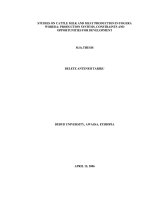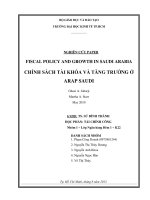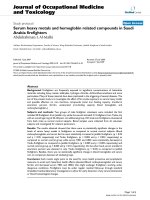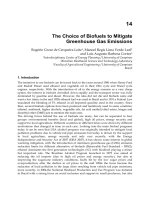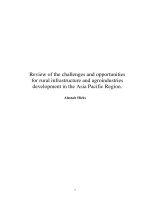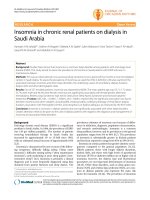Business and management environment in saudi arabia challenges and opportunities for multinational corporations
Bạn đang xem bản rút gọn của tài liệu. Xem và tải ngay bản đầy đủ của tài liệu tại đây (2.26 MB, 277 trang )
Business and Management
Environment in
Saudi Arabia
Routledge Studies in International
Business and the World Economy
For a full list of list of titles in this series, please visit www.routledge.com
15. Multinational Corporations
Emergence and Evolution
Paz Estrella Tolentino
23. Ford and the Global Strategies
of Multinationals
The North American Auto Industry
Isabel Studer Noguez
16. Foreign Direct Investment in
Emerging Economies
Corporate Strategy and Investment
Behaviour in the Caribbean
Lou Anne A. Barclay
24. The World Trade Organization
Millennium Round
Freer Trade in the Next Century
Klaus Deutsch / Bernhard Speyer
17. European Integration and
Global Corporate Strategies
Edited by François Chesnais, Grazia
Ietto-Gillies and Roberto Simonetti
25. Consultancy and Innovation
The Business Service Revolution
in Europe
Edited by Peter Wood
18. The Globalisation of
Corporate R & D
Implications for Innovation
Systems in Host Countries
Prasada Reddy
26. Knowledge Economies
Clusters, Learning and
Co-operative Advantage
Philip Cooke
19. Globalization of Services
Some Implications for Theory
and Practice
Edited by Yair Aharoni and
Lilach Nachum
20. A Century of Foreign
Investment in the Third World
Michael J Twomey
21. Global Capitalism at Bay
John H Dunning
22. Foreign Direct Investment
Research Issues
Edited by Bijit Bora
27. The Role of Resources in
Global Competition
John Fahy
28. Globalization, Employment
and the Workplace
Diverse Impacts
Edited by Yaw A Debrah and
Ian G. Smith
29. Transnational Corporations
Fragmentation amidst Integration
Grazia Ietto-Gillies
30. Growth Theory and Growth
Policy
Edited by Harald Hagemann
and Stephan Seiter
31. International Business and
the Eclectic Paradigm
Developing the OLI framework
Edited by John Cantwell and
Rajneesh Narula
32. Regulating Global Trade and
the Environment
Paul Street
33. Cultural Industries and the
Production of Culture
Edited by Dominic Power and
Allen J. Scott
34. Governing Interests
Business Associations Facing
Internationalization
Edited by Wolfgang Streeck, Jürgen
Grote, Volker Schneider and
Jelle Visser
35. Infrastructure Development
in the Pacific Region
Edited by Akira Kohsaka
36. Big Business and
Economic Development
Conglomerates and Economic Groups
in Developing Countries and Transition
Economies under Globalisation
Edited by Alex E. Fernández Jilberto
and Barbara Hogenboom
37. International Business
Geography
Case Studies of Corporate Firms
Edited by Piet Pellenbarg and
Egbert Wever
38. The World Bank and
Global Managerialism
Jonathan Murphy
39. Contemporary Corporate Strategy
Global Perspectives
Edited by John Saee
40. Trade, Globalization and Poverty
Edited by Elias Dinopoulos, Pravin
Krishna, Arvind Panagariya
and Kar-yiu Wong
41. International Management
and Language
Susanne Tietze
42. Space, Oil and Capital
Mazen Labban
43. Petroleum Taxation
Sharing the Oil Wealth: a Study of
Petroleum Taxation Yesterday, Today
and Tomorrow
Carole Nakhle
44. International Trade Theory
A Critical Review
Murray C. Kemp
45. The Political Economy of Oil and
Gas in Africa
The Case of Nigeria
Soala Ariweriokuma
46. Successfully Doing Business/
Marketing in Eastern Europe
Edited by V.H. Kirpalani, Lechoslaw
Garbarski, and Eredener Kaynak
47. Marketing in
Developing Countries
Nigerian Advertising and Mass Media
Emmanuel C. Alozie
48. Business and Management
Environment in Saudi Arabia
Challenges and Opportunities for
Multinational Corporations
Abbas J. Ali
Business and Management
Environment in
Saudi Arabia
Challenges and Opportunities for
Multinational Corporations
Abbas J. Ali
New York
London
First published 2009
by Routledge
270 Madison Ave, New York, NY 10016
Simultaneously published in the UK
by Routledge
2 Park Square, Milton Park, Abingdon, Oxon OX14 4RN
Routledge is an imprint of the Taylor & Francis Group, an informa business
This edition published in the Taylor & Francis e-Library, 2008.
“To purchase your own copy of this or any of Taylor & Francis or Routledge’s
collection of thousands of eBooks please go to www.eBookstore.tandf.co.uk.”
© 2009 Taylor & Francis
All rights reserved. No part of this book may be reprinted or reproduced or utilised
in any form or by any electronic, mechanical, or other means, now known or hereafter invented, including photocopying and recording, or in any information storage or
retrieval system, without permission in writing from the publishers.
Trademark Notice: Product or corporate names may be trademarks or registered trademarks, and are used only for identification and explanation without intent to infringe.
Library of Congress Cataloging in Publication Data
Ali, Abbas.
Business and management environment in Saudi Arabia : challenges and
opportunities for multinational corporations / by Abbas J. Ali.
p. cm.—(Routledge studies in international business and the world economy ; 48)
Includes bibliographical references and index.
1. International business enterprises—Saudi Arabia—Management. 2. Saudi
Arabia—Economic conditions. 3. Corporate culture—Saudi Arabia.
4. Organizational behavior—Saudi Arabia. 5. Economic development—Saudi
Arabia. I. Title.
HD62.4.A39 2009
658'.04909538—dc22
2008031593
ISBN 0-203-88351-9 Master e-book ISBN
ISBN10: 0–7890–3472–7 (hbk)
ISBN 10: 0–2038–8351–9 (ebk)
ISBN13: 978–0-7890–3472–4 (hbk)
ISBN 13: 978–0-2038–8351–8 (ebk)
Contents
Preface
vii
1
Socio-Political Environment
1
2
The State and Prospect of the Economy
16
3
Regional Markets and Business Environment
35
4
The Manager Role
50
5
Managerial Work Values and Beliefs
69
6
The Meaning and Centrality of Work
92
7
Group Dynamics and Work Relations
104
8
Communications and Negotiations
128
9
Human Resource Management and the Labor Market
142
10 Decision-Making Styles and Attitudes toward Risk
162
11 Organizational Change and Development
174
12 Organizational Form and Design
195
13 MNCs and Development
214
14 Globalization and Business Prospects
227
References
Index
243
255
Preface
The significant role that the Kingdom of Saudi Arabia plays in the global
economy and in political affairs is evident in the worldwide concern over oil
prices and political stability in the Middle East. The Kingdom is endowed
with one-fifth of the world’s proven oil reserves. In terms of production
costs, the Kingdom is considered one of the lowest producers of oil; and
because of its aggressive investment in the energy sector, the Kingdom has
strengthened its role in the world economy and has maintained a noticeable
presence on the global economic stage. Politically, since the early 1970s
the Kingdom has used its oil revenue and its close connection to the United
States to transform itself into a powerful restraining force in Middle East
politics. That is, economically and politically, many countries and the
majority of the world’s population are affected by initiatives and actions
taken by the Kingdom.
In fact, the Kingdom has become the United State’s most trusted ally,
after Israel, in the Middle East. In this newly found capacity, the Kingdom
performs three roles: defender and justifier of U.S. economic interests in the
region, it enables forces to translate U.S. Middle East foreign policy into
a reality and acts as a restraining factor in Middle East Politics. In playing these three roles, the ruling al Saud family understands that its grip on
power is characteristically linked to the approval of the powerful Wahhabi
religious establishment and the support of the United States. Therefore,
the Kingdom’s ruling family has carefully sought to faithfully serve U.S.
interests in the region while closely consulting with the religious authority
on matters related to domestic and Islamic affairs. Accordingly, the regime
has engaged in four interrelated strategies. Economically, it has adopted a
system which optimally serves U.S. interests while strengthening the role of
the ruling family: Sheiko-Capitalism. In terms of oil strategies, for example, the Kingdom has always sought to keep its oil production capacity in
line with the interests of the industrial world and to use oil revenues to coopt opposition. In terms of foreign policy, the Kingdom faithfully performs
the role of executor of U.S. Middle East policy and, behind the scenes, uses
all its energy to paralyze any move on the Arab street to confront such
policy. Third, domestically the regime effectively pursues economic policies
x
Preface
that offer its population a reasonable level of prosperity and simultaneously
focuses its citizens’ concerns on ever-emerging crises, induced or spontaneous, in other Arab countries and other Muslim states, thereby diverting
their attention from domestic affairs. Fourth, it utilizes its financial power
to establish or take over the ownership, direct and indirect, of major Arab
and international media outlets. This has allowed the kingdom to promote
its political vision and to effectively counter views that are in conflict with
the United State’s vision and interests in the Middle East.
In the last few years, the Kingdom has revised its commercial, investment,
and labor laws. In October 2007, the King finally acted upon his promises to
reform the judicial system by establishing specialized courts, including personal status, commercial, and labor tribunals. The new laws are expected to
speed up the review process and significantly reduce routine and bureaucratic
procedures in judgments related to business, labor, and personal grievousness.
These laws, along with membership in the WTO, will enhance international
investors’ confidence in the Kingdom’s market and create an environment
more conducive and friendly for MNC operations.
Over the last forty years, the study of the process of management, its strategic importance, and its environment in the Kingdom has been neglected
by scholars and managers and has usually been left to be covered by journalists instead of undergoing rigorous and professional analysis. The little
that has been written about business and organization in the Kingdom has
not taken into account the cultural assumptions and the nature of forces
which shape business practices and organizational conduct. In fact, there
has been a great misunderstanding about the interplay of forces influencing
business and management practices in the Kingdom, making it impossible
for MNCs and their representatives to formulate a sound and practical
view of the nature of business and work environment. This book, Business
and Management Environment in Saudi Arabia, provides managers, consultants, students of international business, and policymakers with a comprehensive treatment of essential management and organizational issues,
concepts, and techniques.
Business and Management Environment in Saudi Arabia moves beyond
the question of how to do business in the Kingdom. It is an innovative and
authoritative source which provides accurate and significant information, for
MNCs and scholars, on how to capitalize on opportunities in the Kingdom,
avoid minefields, understand the power structure and organizational conduct
of that country, develop sound approaches and strategies to compete effectively, and familiarize expatriates and international managers with cultural
assumptions and deeply held beliefs regarding business norms. The book is
written with the intention of bridging the gap between business and culture
misunderstandings and providing sound theoretical reasoning for how and
why certain management and organizational issues have evolved.
The book is organized into fourteen chapters. These chapters were
written in an integrated way to give readers an accurate understanding of
Preface xi
the nature of business and management in the Kingdom. The interplay of
business, politics, religion, and culture is brought into focus in the most
dynamic way. The fi rst three chapters place considerable emphasis on the
business and organizational environment in the Kingdom and the Middle
East. The next three chapters address cultural values, work orientations,
and managerial roles within and outside the organization. The rest of the
chapters offer detailed practical and theoretical reasoning for and guidelines on the nature of groups, effective communication, human resource
challenges, decision-making styles, organizational change, and the place of
the Kingdom in a globalized economy.
In preparing this book, I had to consult with and seek assistance from
several individuals. All have been very cooperative and supportive. My
deepest appreciation is to Robert C. Camp, my dean at the Eberly College
of Business, Indiana University of Pennsylvania. Bob has provided considerable support for engaging in intellectual and scholarly activities. Drs.
Abdulwahab S. Al-Kahtani and Ahmed Al-Mughrabi from Saudi Arabia
were instrumental in collecting data and in providing needed publications.
Erdener Kaynak, executive editor for international business at the Haworth
Press, is a friend and scholar. His natural cooperative tendency and intellectual instinct make him a valuable asset. In addition, I am thankful to Laura
D. Stearns at Taylor and Francis Group and Ryan Kenney of IBT Global for
their cooperation and assistance.
Furthermore, I would like to thank Dr. Helen Bailie for her careful
editing and useful comments on the manuscript. My assistants, Ashok
Kumar Velayudampalayam Palaniswamy and Nicole Marie Carney, did
a fantastic job in helping me fi nish the book, and I am grateful to Helen,
Nicole and Ashok for their exceptional enthusiasm in working with me. In
particular, my children Fadil, Aziz, and Yasmin, along with their mother,
Huda, have been a source of enjoyment and challenge. To each of them, I
am always grateful.
1
Socio-Political Environment
GENERAL SETTING
Arabia, the center of a rich civilization, is surrounded by water on three
sides (the Arabian and Oman gulfs from the east, Indian Ocean from the
south, and the Red Sea from the west) and by sand on the fourth (Jordan
and Iraq). Historically, Arabia was the center of the caravan trade. Before
Islam, cities flourished on the edge of the huge desert. Commerce, art, and
literature found fertile ground in these cities. Just after the birth of Islam in
Mecca, Arabia came to play a vital political and religious role in the area.
When the capital of the Arab/Islamic Empire was relocated to Damascus
and then to Baghdad, Arabia maintained its strategic importance for Arabs
and Muslims. This is because the holy cities of Mecca and Medina and the
shrines of the Prophet Mohamed and other Islamic figures are in Arabia.
For centuries, two patterns of life have coexisted in Arabia: the Bedouin
and the sedentary. The Bedouins are nomadic people who stress courage
and pride and show independence and generosity. The traditional sedentary population stresses endurance, hardship, submission, and cunning. The
first group produced poets and warriors, whereas the second produced merchants, scientists, and rulers. Both lived in harmony and were dependent
on each other. However, the influence of the sedentary population declined
after the eclipse of the Arab-Islamic State and the beginning of foreign hegemony (Ottoman and European). Consequently, Arabia witnessed a decline
in its economic, political, and social influences. The Bedouins and their way
of life were also shattered and the Bedouins’ Islamic-Arabic traditions gave
way to sectarian and tribal conflicts. Rom Landou, a British scholar who in
the early 1930s visited and lived in Arabia, noted that the West corrupted
Arabia and taught the Arabs racism and intolerance. He stated (1938: 387),
“Racial or national antagonism is alien to the Muslim. It is we in the West
who have made him conscious of race and nationalism. It is we who have
taught him to suspect, to mistrust and, in the end, to dislike us.”
A majority of the population that used to roam the vast arid plains of
Arabia and the Fertile Crescent just to earn a minimum income became
prosperous in the few years following the discovery of oil in the twentieth
2
Business and Management Environment in Saudi Arabia
century. Modern facilities were constructed, and consumption of luxury
goods and services became the norm. The discovery of oil also contributed
to the establishment of independent entities in Arabia: Bahrain, Kuwait,
Oman, Qatar, Saudi Arabia, United Arab Emirates (UAE), and Yemen.
Most of these states were created by fiat in order to institutionalize the
political hegemony of the colonial power (e.g., Britain). Kuwait, Qatar, and
the UAE were declared independent city-states by the British government
during the 1960s and early 1970s. Later, as economic interests of the ruling
elite matured, imaginary national boundaries were sanctioned and became
a device for defi ning economic relationships between powerful business
and tribal elites nurtured during the colonial era.
Arabia is characterized by extreme contrasts. Economic disparity, as
reflected in per capita income, is very wide (per capita income in Yemen
in 2005 was $600 vs. $11,770 and $23,770 in Saudi Arabia and the UAE,
respectively). Bahrain, Kuwait, and Qatar, for example, are city-states,
whereas Saudi Arabia is a huge desert with scattered but highly populated
cities. While unemployment is high in Yemen—about 35 percent—the other
states rely heavily on foreign workers that made up 60 to 90 percent of the
total work force in 2005. A vivid example of heavy reliance on foreign workers is the UAE. The percentage of nationals in the UAE declined from 36 percent in 1975 to less than 10 percent in 2003. Defense expenditures per capita
ranged from $810 in Saudi Arabia to $1,770 in Kuwait in 2005 (Ehsani,
2006). In terms of total defense expenditures, however, Saudi Arabia tops
the list in the Middle East with its order of $50 billion in military hardware
in 2006 (Al Jazeera, 2007). The region, in general, is considered strategically
vital to the global economy because of oil reserves and its geographic location. About two-thirds of the proven oil reserves in the world are located in
the Gulf region. The Gulf Crisis (August 1990–March 1991) and the subsequent invasion of Iraq in 2003 provided vivid evidence of the volatility and
importance of the region for world stability and economic prosperity.
A Western life style coexists with the traditional one in most of the Gulf
states, but in Yemen the traditional way is still the norm. Indigenous populations in the Arab Peninsula share a similar cultural background. Almost
all of them are Muslim Arabs who display similar outlooks and orientations. With the exception of Yemen, the ruling elite in the Arab Peninsula are sheiks and heads of tribes. They have absolute authority and are
accountable only to senior members of their respective clan. Businesspeople
across Arabia are related in one way or another (e.g., through kinship,
tribal networks, marriage). Studying a particular segment thus gives a fair
picture of the orientations and demands of the whole indigenous population across Arabia. Saudi Arabia, in particular, because of its size and
political and social dominance, represents the nature of the business and
economic mode prevailing in the region. In fact, despite the outstanding
economic performance of the UAE, in recent years, Saudi Arabia’s role and
prospect as the leading player in the region is not expected to diminish for
Socio-Political Environment
3
the coming decades. The primary focus in this chapter is on Saudi Arabian
business and social environments. Implications and future recommendations are applicable to Arabian executives in general and are useful for
multinational corporations (MNCs) operating in the region.
ISLAMIC ENVIRONMENT
It is fair to suggest that many Arab management practices are rooted in
Islamic and pre-Islamic practices. During the fi rst six centuries of Islam
(beginning with the sixth century), knowledge, trade, industry, agriculture,
and construction of complex organizations flourished. Work and creativity
were honored in all their forms. Quranic principles and prophetic prescriptions served as guidelines for Muslims in conducting their business and
family affairs. For Muslims, Islam is a way of life and is a source of spiritual
power that sustains and enforces a high moral standard. Izzeddin (1953)
suggests that Islam significantly contributed to organized work, indicating
that industries and trades were organized in corporations and guilds before
the collapse of the Arab-Islamic state around 1258. She argues that Islamic
moral foundations encouraged businesspeople and artisans to have a sense
of duty toward their craft and toward one another. Honesty and sobriety were characteristic qualities of Muslim craftsmen. In the golden age of
Islam, people sought perfection in their work, and in their search for truth
they acknowledged that there is nothing of higher value than truth itself.
Various Islamic schools of thought flourished during the Arab-Islamic
Empire. There were at least six Islamic schools (see Ali, 1990, 2005, for
more details). The fi rst was Jabria (predestination). It asserts that man is
not responsible for his/her actions and that tradition must take precedence
over the power of choice. It relies on clearly defined rules and complete
obedience to authority. Rational arguments are prohibited and individuals
must follow the leader’s instructions. The second school is the Tafwiz (delegation). This school emphasizes free will and unqualified discretion in the
choice of wrong and right because rules and regulations constrain human
and organizational life. In organizational life, employees assume different
tasks and duties and collective responsibility is preferred. The third is the
Ikhtiar (choice) school, which shares the Tafwiz emphasis on free choice
but differs in the belief about man’s capacity to turn evil into good. Unlike
the Tafwiz school, it stresses that man is at liberty to commit a good or bad
deed, infl ict pain or joy, and that he is solely responsible for his actions.
Man is believed to be a responsible social actor striving to work with the
group and to achieve the group’s goals in a harmonious and cooperative
environment. The Mutazilas (rationalistic) school believes that all knowledge must be attained through reason. This school holds that nothing is
known to be wrong or right until reason has enlightened us to the distinction and, further, that everything is liable to change or annihilation. It
4
Business and Management Environment in Saudi Arabia
maintains that free will and democracy are prerequisites to action and the
prosperity of society. Denial of ability and free will stifles creativity and
destroys the soul.
The fi fth school of thought, advocated by Ibn Rushd (or Averroes, c.
1126 AD), holds that actions depend partly on free will and partly on external environmental forces that serve to restrain and/or determine individual
and collective action. The participative democratic process is thought to be
the ideal organizational form and autocracy is believed to open the door to
human misery. The sixth and fi nal school, the Ikhwan-us-Safa (Brothers
of Purity), arose in the tenth century in response to the oppressive practices
of the Jabria School. During the tenth century, liberal-minded thinkers and
philosophers were tortured and persecuted. Nevertheless, a small body of
thinkers formed themselves into a brotherhood to hinder the downward
course of Muslims toward ignorance and narrow-mindedness. They established secret organizations across the Islamic nation and wrote letters as a
way to disseminate thought. The school advocated rationalism, self-discipline, and self-control. Ikhwan-us-Safa believed that faith without work
and knowledge without practice were futile and that corruption and disorder were symptomatic of tyranny. They displayed a strong faith in man’s
ability to make progress and to control the environment.
The previously mentioned schools had tremendous influence on the way
in which Arab and Islamic states were organized and on the way business and personal transactions were conducted. For example, the Ottoman Empire (1412–1918) subscribed to some aspects of the Jabria School
whereby centralization of government affairs and strict adherence to specified rules were the norm. Since then, with the exception of the Jabria, these
schools of thought have become part of history. In Arab states, independent
thinking, concepts of liberty, and the power of a free mind were condemned,
and Jabria principles were sanctioned in every aspect of life. This is visible in
Saudi Arabia today, where the government ascribes to the Jabria School. In
Arabia, the birthplace of Islam, it is not difficult to imagine the flourishing
of the Jabria School. The conditions of Arabia after the collapse of the Arab
empire and the dramatic downward course of Arab civilization fostered the
growth of Jabria. The harsh desert environment, the humiliation of Arabs
at the hands of foreign elements (Turks and Mongols), isolation from the
rest of the world, and cultural discontinuity—centuries of living in an age of
darkness or ignorance with no knowledge of Arab civilization and history—
opened the door for disintegration, conflict, and an authoritarian outlook
in Arabian society. It was in the eighteenth century that Wahhabism, the
official sect of the Saud ruling family named after Mohammed Ibn Abdul
Wahhab, 1703–1792, began. The movement, originally, was a call to restore
Islam to its purest aspects. In practice, however, Wahhabism appears on
many occasions to compromise on basic aspects of early Islamic thinking:
tolerance and flexibility. Increasingly, in recent years, critics of the movement have argued that Wahhabism is more inclined to discount the role of
Socio-Political Environment
5
community “ijma” (consensus) and disregard the consultative (democratic)
form of Islamic government as it is specified in the Quran (e.g., Holy Quran,
3:159, 27:34, 42:38) and Islamic traditions of the Rashidun caliphs (rightly
guided successor of Prophet Mohamed). Nevertheless, the current King
Abdullah, then prince, argued in 1962 that “if there is any truly democratic
system in the world it is the one now existing in Saudi Arabia. Our understanding of democracy is that it permits direct contact between the people
and the ruler. . . . Anyone can secure an audience with the King and argue
with him about the sharia” (quoted in Powell, 1982: 366). Since then this
view has been widely promoted in countering critics and opponents of the
regime. Indeed, Foreign Minister Saud al-Faisal, in his remarks to the U.S.
Council on Foreign Relations (2005), reiterated the same when he stated
that the system in the Kingdom enables “any person in Saudi Arabia to take
his or her grievance directly to any official including the King.”
One of the most distinct aspects of Wahhabism is complete obedience
to rulers. This particular orientation has been instrumental in sustaining
and strengthening the Saudi regime and in easily aligning various tribal and
community leaders behind the King and the decisions made by the senior
members of the al Saud family, the ruling family. Historically, the latter,
under the leadership of its founder, Mohammed Ibn Saud, who was the
tribal leader of the village of Diriyah around 1744, established a pact with
Ibn Abdul Wahhab to provide him with protection as long as he showed
allegiance and loyalty. Since then, this pact has been strengthened through
marriage and mutual interests. Wahhabi religious leaders who control most
mosques in today’s Saudi Arabia have played significant roles in promoting
religious and political edicts that serve the interest of the government. The
Saudi family, in turn, has been successful in integrating the Wahhabi leaders in daily functions of government (e.g., approving new laws, advising,
and participating in official ceremonies). Sanetan (2004) in his study of the
elites in the Kingdom has concluded that religious leaders, in their quest to
enhance their personal interests, have been successful in molding religious
principles to be in line with the wishes of the ruling family. Two examples
shed light on the vital roles of the religious Wahhabis to the ruling Saud
family. First, at the onset of the Gulf Crisis (August 1990), the Wahhabi
sheiks ignored the Quran’s instructions to Muslims not to rely on foreign
protection (Holy Quran, 4:51 and 5:57). The head of the religious authority, Ibn Baz, in justifying the attack on Iraq, issued a fatwa calling Saddam
Hussein of Iraq an infidel stating that “He is an infidel even if he says, there
is no God but God; prays and fasts. . . . This is the case of Saddam and
those like him, who declares Islam hypocritically and who oppresses and
harms Muslims and stands by his ungodly Baathist ideology.”
Second, when Islamic scholars and intellectual groups petitioned the
King in late May 1991 to meet certain demands (e.g., the establishment
of an independent consultative council, the observation of Islamic principles in government action and conduct, the establishment of a defense
6
Business and Management Environment in Saudi Arabia
and information system that does not serve foreign interests, competent
and qualified personnel for embassies abroad, respect for individual dignity, and adherence to due conduct and procedures), the Wahhabi religious
authority denounced the group. The religious authority considered the petition un-Islamic as it did not observe the edict that people must obey the
ruler whether right or wrong. They stated: “The manner in which the petition was published and distributed does not serve the [general] interest,
neither does it help Muslims observe piety and virtue” (Arab News, June
1991). Most recently, the chairman of the Islamic scholars, Abdulaziz Al
Al-Sheikh, issued a warning to youths in Arabia to obey the ruler, stating
that by joining jihad abroad “the youths commit a number of violations
of Islamic orders and teachings including disobedience of our rulers and
subject themselves to be attracted by deviated elements and misuse their
enthusiasm to achieve political and military gains for suspicious quarters”
(Saudi Press Agency, 2007).
SOCIAL ENVIRONMENT
Arabian society is a mosaic one. Various groups, traditions, and patterns of
life coexist. Since the mid-1940s, the simple life that the majority of indigenous citizens used to enjoy has given way to more complex and sophisticated
patterns. During the pre-oil boom era, most Arabians merely sustained
life and were comfortable with a minimum standard of living. Only a few
tribal, political, and merchant elites lived in prosperity. The discovery of oil
and the sudden increase in oil revenues in late 1973 changed the Arabian
social and economic structure. Cities and towns flourished (e.g., Dammam,
Jeddah, Jubail, Riyadh, Yunbi) and per capita income increased ($1,040 in
1972 vs. $15,645 in 1985). Arabia has evolved in the last forty years into
an urbanized oil-based economy and has established manufacturing-based
industries using the latest Western technology.
Society in Arabia has always been highly personalized. Friendship, kinship, regionalism, and communal relationships have had a significant influence on individual action and behavior. Relationships evolve around the
person-tribal network. Despite the erosion, for historical reasons, of tribal
organizations, individuals take great pride in keeping up their tribal traditions, divisions, and Bedouin heritage. Ghazi al-Qusabi (2006), a seasoned
minister, noted that a high percentage of citizens in the Kingdom still consider themselves, in terms of tradition and tribal origin, from the desert.
Previously, Patai (1983: 76) stated:
The preservation in many families of a tradition of or claim to tribal
ancestry is another common form of nostalgia for Bedouin virtues.
Such traditions and claims are found among inhabitants of small towns
and large cities alike, even in families who have been town dwellers for
Socio-Political Environment
7
many generations. People of humble circumstances, such as artisans
and workers, preserve the tradition of their Bedouin descent carefully
and jealously, for it supplies them with the one and only claim they
have to a semblance of status and social importance.
Both in urban and rural centers, tribal identity and loyalty are persistent and command respect with special privileges bestowed on those with
recognized lineages. Family, however, is still the basic social unit to which
individual members are subordinate. The transformation of Arabia into a
semi-industrial and semiurban society, however, has given new meaning
to the role of family. In the old traditional sectors (Bedouin and rural),
family relations reach beyond the extended family to include the entire
kinship network. Individuals not only identify with larger organizations
(tribes), but their welfare and fate depend on the actions of that network as
a whole. In cities and towns, however, the tribal network evolves primarily
around extended family. Individual concerns and loyalty are to parents,
grandparents, and immediate relatives. The tribe plays a reinforcing factor
that sustains the continuity of the social fabric and revitalizes the role of the
extended family. It has increasingly become a source of reference or pride.
Furthermore, Bedouin tradition and values are still apparent in the behavior and orientation of the majority of the indigenous population. Powell
(1982) observes that one gets the distinct impression of the legacy the desert
has left even in the heart of a major city. He states (p. 158): “The egalitarianism of the Bedouin is ever present. Hospitality is extended without
regard to social or economic rank . . .” Urbanization and the accompanying flourishing of schools and business and government networks may give
the appearance of modernity but are not yet effective in reducing the need
for tribal organizations. This, however, has not precluded the emergence
of new relations based on social class identification, career interests, religious activities, and social and organizational interests among career oriented individuals and the rising middle class. Though this development has
not been widely accepted, it is more likely that this new trend constitutes
the beginning of a new social foundation that Arabian society has never
experienced before. It is this new foundation that poses a challenge to old
political thinking and patterns of relations. In fact, with the rapid degree of
urbanization, educational achievement, and economic affluence, confl icting loyalties may appear on the social and political stage. The outcome of
this divided loyalty remains to be seen.
The rising middle-class businesspeople display a high level of sophistication. Their business judgments are increasingly based on facts and
objective data more than on subjective inclinations or emotional considerations. However, the latter may persist, as it was cultivated in the early
days by social upbringing and lavish paternalistic attention to children.
Social forces, too, may shape emotional tendencies as these forces reinforce
what is cherished and desirable and articulate the necessity of showing
8
Business and Management Environment in Saudi Arabia
passionate attachments to inner groups. But ever-looming fear of regional
political upheaval coupled with a possible sudden decline in oil prices, a
shift in economic and social priorities (e.g., emphasis on private initiative
and investment, class consciousness, privilege of social class relations), and
familiarity with international nuances have strengthened the middle-class
competitive spirit and entrepreneurship. In the political realm, the middle
classes are aware that their freedom is limited but they have managed to
carve a fi ne balance between their business demands and the political reality of absolute monarchy. Their flexible ethics and long-term perspective
enable them to control an unease, often unnoticed, with the lack of political freedom. This may evolve, in the future, into a tension with the ruling
family, thereby threatening the stability and prosperity of the rising middle
class. In an environment of little or no political openness and of supremacy
of personal relationships, neither government officials nor businesspeople
would like to publicly lose face with the ruling family. Members of the business community, in particular, know that when the ruling family withholds
its approval or support for a business person, the immediate and inevitable
result is a sudden decline of fortune and a business calamity. While wealth
and family name are often a prerequisite for economic and social advancement, the ruling family’s approval and support has been always the most
pivotal factor.
Though Saudi Arabia confronts several social problems, the most pressing are those that are related to youth resentment, diminishing opportunities, and women’s roles in the society. These problems are not exclusive and
taken collectively they could be a serious destabilizing political factor. In
2004 the population reached 24 million people. The percentage of youth
in the total population is relatively high. The Eighth Development Plan
(2004–2009) shows about 40.4 percent of the total Saudi population is
below fifteen years of age and the median age of the population is estimated
at 17.3 years. This means that one-half of the population is at or below age
17.3 years. Most of the youth population is concentrated in the relatively
few urban centers. This could make this group a potential bombshell and a
source for social and political unrest. This particular group, relative to other
and previous generations, has access to satellite communications and various sources of media. This factor, coupled with an extensive use of cellular
phones and other media technologies, make the youth less inclined to show
conformity to social and political order. Their exposure to world politics
and their interest in unbridled political and religious debates via Arab and
foreign television satellites such as Al Jazeera, al-Arabia, al-Manar, BBC,
and CNN reinforce such tendencies and most likely lead them to question
political decisions and the ruling family. Bradley (2004) suggests that the
frustration among the youth in the Kingdom is akin to that which led to the
French Revolution. However, Bradley’s assertion that this frustration and
resentment toward the privileged classes and the ruling family is certain to
result in a popular revolution against the al Saud family seems unrealistic
Socio-Political Environment
9
given the nature of prevailing social forces, the depth and complexity of the
Saud family network with tribes, influential families, Wahhabi religious
authority, and the superpowers. This, in addition to the ability of the ruling
family to manage social and political crises, makes it impossible to have a
full-scale uprising.
In an editorial in 2003, the New York Times argued that the rapid
growth in population, the decline in oil prices, and widespread corruption
in Saudi Arabia will eventually translate into diminishing opportunities
and rising discontent. In spite of these, the real challenge facing the Kingdom, which will be addressed in the chapters that follow, is the ability to
maintain equitable access to economic and political opportunities. While
the social fabric has been a factor in maintaining at least the appearance of
social cohesion, economic changes at home, social mobility, regional instability, and rapid integration in the world economy may erode or weaken
the social foundation and traditional allegiances as the government fails to
meet the rising demands of a youthful generation. Since the early 1970s,
the economy has been relying heavily on foreign manpower, and a large
and growing segment of educated Arabian individuals has enjoyed access to
government jobs and lavish government spending. Oil revenues, however,
are not expected to steadily increase and the government may have limited
capacity to absorb the ever-increasing number of high school and college
graduates. Successive development plans have envisioned a role whereby
the private sector offers opportunities for the new graduates to work and
participate in economic activities. The private sector, however, has not performed according to governmental expectations, making diminishing economic opportunities a potential reality.
A challenging issue that faces the government in Saudi Arabia is the
rate at which women are slowly being integrated in the workforce. The
government appears to be aware of this challenge and its economic and
social consequences. The participation of women in the workforce has been
assertively protested by the Wahhabi religious authority. In spite of this, the
government has been gradually enabling women to participate in the marketplace though the rate of participation is still considerably low, averaging
about 10.3 percent in 2003. Women, however, are graduating from a large
number of high schools and colleges. The Eighth Plan shows that female
students constituted 48.6 percent of the total number of students. Enrollment in junior and senior high schools has reached 50.3 percent, female
students in higher education have outnumbered male students, and the rate
of female graduates reached 56.5 percent of the total number of graduates.
In addition to limited economic opportunities, women in Saudi Arabia
face other problems such as the right to drive, to travel abroad without
an accompanying male relative, and participation in the political process,
especially elections. Comparatively, in recent years, women have achieved
modest progress, and this progress is destined to lead to more opportunities. Western media, however, seems to be more obsessed with what women
10
Business and Management Environment in Saudi Arabia
wear outside their homes, as almost all women in the Kingdom have to
cover themselves in black cloaks or abaya, than women’s social and economic progression. For example, in his visit to Saudi Arabia, New York
Times columnist Nicholas Kristof (2002) described women gathering in a
mall, stating, “I spotted a surreal scene: three giggly black ghosts, possibly
young women enveloped in black cloaks called abayas, clustered around
a display in a shopping mall, enthusiastically fi ngering a blouse so sheer
and low-cut that my wife would never be caught dead in it.” Many politicians and reformers in the Kingdom assert that women’s dresses are cultural issues and part of prevailing social norms and are not impediments to
their integration into the labor market. These reformers, along with a large
segment of professional women, view economic opportunities, the right to
drive and vote, and fairness in employment, rather than attire, as the most
serious obstacles for women’s social and economic progression.
POLITICAL ENVIRONMENT
Saudi Arabia’s political system is a monarchy. It is ruled by a king and
senior members of his family. They have absolute authority and the fi nal
say on how things must be managed. These range from social and economic to political issues. Arabian society is characterized by the presence
of a well-entrenched tribal system and close adherence to Wahhabi Islamic
thought. Since the establishment of the current monarchy system in 1932,
the Saudi ruling family has based its legitimacy on two pillars: Wahhabism
and tribal allegiance. In fact, the strength of the ruling family has rested
on the ability to maintain and exploit both tribal and religious traditions.
The Saudi rulers’ skills in dealing with conservative Wahhabi elites enable
them to maintain unquestionable acceptance of their authority. Refusal to
accept al Saud family authority is considered to be the most heinous moral
crime an Arabian individual might commit. Perhaps the fi rst serious religious attempt to violate Wahhabis’ allegiance to the al Saud ruling family
took place on November 20, 1979, when a political Wahhabi group seized
the Kaaba in Mecca. The siege of the holy place, Kaaba, continued for a
few weeks until the government used force to end the siege and eventually
arrested the group leader, Jehman al-Autabi.
In 1932, Abdul Aziz Ibn Saud was successful in uniting various parts of
Arabia after militarily defeating his rivals—tribal and religious leaders—
in fierce battles. He established a kingdom and named it after his clan,
the Saudi. Ibn Saud was shrewd and initially left the autonomous status
of many of the scattered tribes across Arabia intact. This, at the time,
enabled these tribes to exert influence on the ruling family but gave Ibn
Saud the opportunity to cement alliances and build the foundation of his
power. Nevertheless, Ibn Saud, with the help of British advisors, initiated
a plan that gradually destroyed the socio-political autonomy of the tribes.
Socio-Political Environment
11
Cole (1982) indicates that the al Saud ruling family took several steps to
implement this plan. First, the urf or customary tribal law as practiced by
tribes was declared illegal and was replaced by the Sharia or Islamic law.
The law is administered by religious judges and other state representatives
appointed by the ruling family. It replaced the scattered tribal “arbitrators”
and established a unified centralized code. The code was enforced and its
religious justifications were communicated to tribal leaders. Since the latter
had little, if any, knowledge of Wahhabism, religious authority stepped in
and assumed additional influence at the expense of tribal leaders. The second was the abolition of the hima system, the communal ownership of certain territories where grazing was restricted to particular tribes. This led to
reduced armed confl ict between tribes and to weakened tribal solidarity as
it contributed to the breakdown of the socio-political autonomy of tribes.
Third was the creation of the Ikhwan al Muslimin, the Muslim Brotherhood, to spread and enforce Wahhabi Islamic thought. The Ikhwan assumed
three initial responsibilities: to promote the sedentarization of tribesmen in
agricultural settlements, to send preachers among the Bedouin to convert
them to Wahhabism and to convince them that many of their actions were
not Islamic, which could lead to severe consequences, and to put an end to
Bedouin independence as tribal warriors by killing their horses (the basis of
independent tribal military action). Later on, the Ikhwan assumed a security or law enforcement role, making them a formidable force in protecting
the al Saud family and the Wahhabi religious establishment. This was and
is still conducted by the Organization of Propagation of Virtue and Elimination of Vice. And lastly, the Saudi family incorporated tribal leaders into
a highly centralized and bureaucratic system. The titles of sheik and administrator were given to tribal leaders and access to lucrative businesses was
secured for them. The traditional fi nancial independence of the tribal leaders and the contribution of tribal members were weakened or eliminated.
By making social privileges and access to wealth contingent on the degree
of relations to the king’s palace, the al Saud ruling family has been effective
not only in eventually diminishing the traditional tribes’ independence but
also in creating a new type of loyalty that transcends the normal kinship
basis and ensures the emergence of a salary-dependent population .
For many years, the ruling family attributed the stability of the Kingdom, the munificence of the king, and the validity of the monarchy system
to God’s blessing, thus making a strong argument that their hold on power
was religiously ordained. The Gulf Crisis (1990–1991) and its aftermath
exposed the vulnerability of the regime. The ruling family had to invite
foreign troops to station themselves in the Kingdom to protect the regime
from possible attack by Iraq and to force it out of Kuwait. At least two
developments are linked directly to the aftermath of the Gulf Crisis. First,
the public showed dissatisfaction with the presence of a large number of
foreign troops on Arabian soil. Some members of the Wahhabi religious
authority publicly denounced the presence of American troops and were
12
Business and Management Environment in Saudi Arabia
jailed. Several religious groups, notably the one which was led by Osama
Ben Laden, broke rank with the ruling family and called for the replacement of the al Saud family. Though the group politically does not pose a
credible threat to the regime, its mere existence constituted a challenge that
the ruling family takes seriously. The second development is the increasing demand, both domestic and internationally, for political tolerance, selfexpression, openness, and liberalization of the government system. Just
before the invasion of Iraq in 2003, several influential individuals, including
reformed and conservative religious figures, signed a document (February
17, 2003), “The National Reform Document,” and submitted it to Crown
Prince Abdullah. The document, while reaffi rming allegiance to the ruling
family, accentuated the necessity for establishing a constitutional government and the development of a “basic law system to strength the constitutional concepts . . . the separation of the executive, judicial and legislative
authorities, and ensuring of the citizen’s basic rights in justice, equality, and
equal opportunity.” The document, too, called for direct elections, fairness
in wealth distribution, prevention of bribery and expropriation of public
land, designing of sound economic plans, political inclusiveness, promotion
of human rights, and granting the rights for self -expression on matters of
public affairs.
The Saudi ruling family has with considerable ease dealt with the problem of containing discord and preventing major political crises. Members
of domestic groups who sought a greater voice in the political process and
more openness have been virtually incorporated into the system or are
allowed to voice their concerns through sanctioned channels. Furthermore,
in 2005, the Kingdom for the fi rst time experienced municipal elections.
Several religious and tribal figures ran for offices. The outcome was predictable as religious figures or those who were promoted by the religious
authority won a significant number of seats. While this development seems
to be a trivial one for the West, in Saudi Arabia the mere participation
in an election inaugurates a new era where people are given an opportunity to take part, though limited, in a political exercise. This particular
development may represent a profound change in the political atmosphere
and could set the stage for further openness and inclusion in the political process. While the ruling family and the religious authority have been
careful to maintain a significant degree of control on the municipal election process, there is no guarantee that those elected will show obedience
and conformity to sanctioned political norms and order. Political expectations and confidence may translate into a political capital that ultimately
erodes the traditional political base. Municipal elections and the necessity
for political reform were forced upon the government after the 2003 invasion of Iraq. Perhaps the first Gulf Crisis (1990–1991) was instrumental in
inciting nationalistic Arab and religious feelings, while the second crisis of
2003 radicalized the indigenous population.
